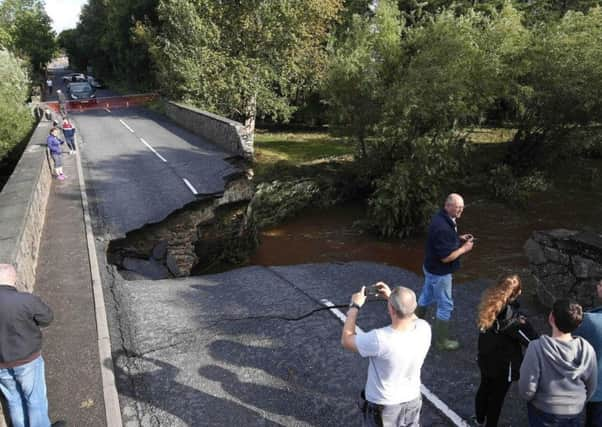£1.2m repair bill for the washed '¨out bridges at Claudy and Park


That’s according to the Department of Infrastructure’s Strategic Roads Improvement Manager for the Western area, David McKinley, who confirmed that repairs to the Ballynameen Bridge in Claudy, which was spectacularly destroyed by the River Faughan during the floods, are unlikely to be complete until the summer.
The cost of fixing the bridge and rendering Church Street in the village fully passable once again will be around £700,000, said Mr McKinley.
Advertisement
Hide AdAdvertisement
Hide AdThe nearby Glenrandal Bridge in Park, meanwhile, which was wiped out by the Faughan tributary that gives it its name, will have to be replaced completely, the senior roads service engineer told a special meeting of Derry City and Strabane District Council on Thursday.
The collapse of the two bridges is partly responsible for four roads in the Derry and Strabane area still being closed three-and-a-half months after the natural disaster, Mr McKinley told council members. However, it is hoped that the two other roads that remain closed will be reopened in a matter of weeks.
The Ballybogie Road in Ardmore, for instance, should be open to traffic by Christmas.
It will take slightly longer until traffic is flowing freely on the Gorticross Road, however, although its expected it will be back on the network by February. Two-and-a-half million pounds have already been spent on repairs.
Advertisement
Hide AdAdvertisement
Hide AdDfI staff inspected 650 bridges in the immediate aftermath of the flooding. Sixty-three of those inspected in the Derry and Strabane area were assessed as being in need of repairs.
Jonathan Kee, Director of Development, at DfI Rivers Agency, told the council that 2,900 metres of flood defences, principally on the Faughan, the Burn Dennet and the Owenkillew, had been damaged in the flooding. Rivers Agency staff have already repaired 2,100 metres of these and are making progress on the 800-metre deficit.
Brian Doherty, of the Department of Agriculture, Environment and Rural Affairs confirmed farmers were significantly affected.
Arable crops were badly hit and the hiatus in silage production and the necessity of housing animals indoors during the floods helped precipitate a winter fodder crisis for some.
DAERA, however, secured dispensation from the EU to increase its advanced CAP payment rate from 50 percent to 70 percent and administered £285m of this between October and December.